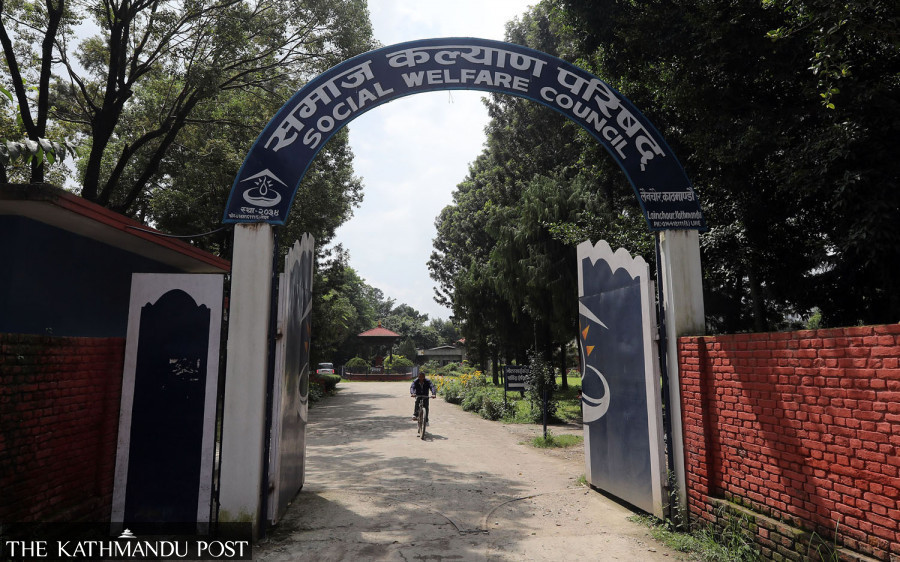National
New policy allows social organisations to divert up to 15 percent budget to disaster response
They have also been asked to keep one percent of the total budget in reserve as an emergency fund.
Prithvi Man Shrestha
The Social Welfare Council has adopted a policy allowing non-governmental organisations to divert up to 15 percent of their annual budgets to disaster response.
Even though the council, the regulator of non-governmental organizations, had asked the organisations to divert 5-20 percent of their funds towards Covid-19 response after the second wave of the pandemic, it was a temporary policy especially aimed at addressing the funds crunch for fighting the pandemic.
The council announced the policy while introducing the new Project Agreement Format early this week.
“The new policy was designed to enable domestic and foreign non-governmental organizations to mobilize their resources quickly in the future disasters and emergencies,” said Pushkar Khati, member secretary at the council. “We introduced the policy based on the lessons learnt during the ongoing Covid-19 crisis.”
Khati said that domestic and international non-governmental organisations could divert upto 15 percent of their total budget once the government makes an appeal for support in times of disaster. “ During the Covid-19 crisis many questioned what were the non-governmental organizations were doing as it took them some time to divert their funds to fight the pandemic,” said Khati.
According to him, such a policy would help the organisations to convince their donors abroad regarding the need for funding in disasters with donors also being well aware of the provision.
Some international non-governmental organizations had complained that it was taking them time to convince the donors to divert their funds towards pandemic response as the donors wanted the funds to be spent for achieving certain other objectives.
As per the amended Project Agreement Format, the council has also opened the door for domestic and international non-governmental organisations to keep a reserve of one percent of their total budget as an emergency fund for disaster response. Alongside mentioning allocations for programme costs, administrative costs and start-up costs, non-governmental organizations have also been asked to specify their allocations for disaster response.
“But, we have not made it mandatory because it may not be appropriate to ask the organisations working in the human rights sector to allocate their funds for disaster response,” said Khati.
With the country facing major disasters like earthquakes in 2015 and Covid-19 pandemic since 2020, the council said that it felt the need for a long-term policy that would help generate certain resources to respond to disasters quickly. International non-governmental organisations have supported the council’s move.
“An open policy like this will help respond to future crises and emergencies,” said Dr Sushil Koirala, president of the Association of International NGOs in Nepal, an informal network of international non-governmental organisations operating in Nepal. “Because the approval process for fund diversion has been taking a long time as documents need to be circulated to different government agencies.”
Koirala, who is also the country representative for Damien Foundation, a Belgium-headquartered organisation, said, “In fact, I had suggested to the council to make a provision where NGOs should keep a certain amount of funds in reserve for emergencies.”
Non-governmental organisations were active in supplying medical goods such as oxygen cylinders, oxygen concentrators, oxygen plants and ventilators among other things during the peak of the second wave of Covid-19 earlier this year.
They also provided various kinds of assistance to vulnerable groups during the first wave of the pandemic last year when the government imposed a nationwide lockdown for nearly four months.
According to the council, domestic and international non-governmental organisations distributed eight oxygen plants, 3,258 oxygen cylinders, 813 oxygen concentrators, 20,098 polymerase chain reaction testing kits, 838,909 face shields, 177,322 antigen test kits, 153,776 personal protective equipment, and 2,920 thermal guns among other things as of July 30.
In May, the country’s health system nearly collapsed when the hospitals were overwhelmed with Covid-19 patients and they were forced to turn away patients for lack of oxygen and beds.
After the council asked international non-governmental organisations to divert their funds to combat the pandemic, they committed Rs1.54 billion and local non-governmental organisations pledged Rs1.05 billion to help the country recover from the second wave of the pandemic, according to the council.
As per the council’s notice, non-governmental organisations with an approved budget of up to Rs 50 million have been asked to divert 20 percent of the budget for Covid-19 preparedness and response, those with budget of up to Rs 100 million 15 percent, those with budget of up to Rs 250 million 10 percent, those with budget up to Rs500 million 7 percent, and those with budget of more than Rs500 million have been asked to divert 5 percent of the budget to fight the pandemic.
In April last year, during the first wave of the pandemic, the council had requested international non-governmental organisations to divert 20 percent of their programme budget to carry out activities for the prevention and control of Covid-19.
International organisations had spent Rs1.5 billion donating health equipment and running livelihood programmes for those affected by the pandemic last year, according to the council. Likewise, local organisations had spent around Rs270 million in pandemic response last year.




 9.7°C Kathmandu
9.7°C Kathmandu














